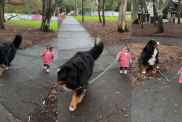Moderator: HOSTED EVENT ALERT: Welcome to this Wednesday’s PetChat hosted event with Michele Hollow. Michele will answer your questions about getting a job you love with animals. Welcome Michele!
Michelechollow: Glad to be here.
Valentine: Hi Michele! Thanks for making the time today
Michelechollow: Hello. My pleasure.
LeslieSmith: Michele, can you talk a little bit about your book to begin the discussion?
Michelechollow: I wrote a book called “The Everything Guide to Working with Animals”. Like the title says, it’s a career guide. It’s published by Adams Media.
Valentine: If I may ask, what kind of careers have you been involved in with animals?
Michelechollow: Most people think of becoming a veterinarian or vet tech, maybe an animal trainer. Those are great jobs, but there are so many more options. One of the most unusual jobs I found was a makeup artist to animal actors. This person wanted to work with animals but she didn’t want to be a vet. Her high school guidance counselor told her that she could be a vet tech or maybe a dog groomer. She really wanted to train dogs and other animals. She kind of fell into becoming a makeup artist for animals.
Valentine: Wow! That’s a new one, never even thought of that one! How does someone get started? Is there some kind of data base or some kind of network with listings?
Michelechollow: What I mean by makeup artist is that animal actors have stunt doubles, just like their human counterparts. Think of a Dalmatian. We all know what a Dalmatian looks like, yet they aren’t identical. In the film, 101 Dalmatians, there were 3 dogs who played each lead. So this makeup artist–her name is Rose Ordile–she had to apply makeup to the dogs to make them look identical. Rose also works as Morris the Cat’s handler.
Michelechollow: What do you mean by data base or network with listings?
Valentine: I love animals, and would love to work with them, but like your example, a vet’s not my choice of work
Valentine: What’s my first step in getting involved?
Michelechollow: There are so many options. The first step is to talk to people who are working in the field that you are interested in. If you want to be a zoologist or a vet or a dog groomer, talk to the experts. It’s amazing. People love talking about their work, and the people I interviewed in my book love their jobs. Every one of them looked forward to getting up and going to work. Everyone of them started out volunteering. Whether they were kids or adults who changed careers, they volunteered doing a lot of grunt work. That means cleaning cages in kennels, feeding animals, doing some office paper work. You don’t start out doing the big tasks, but you are around people who do.
Michelechollow: My technical editor on the book, Dr. William Rives, head vet and director of Six Flags Great Adventure’s Wild Safari in Jackson, NJ, volunteered when he was in school. While “working” in a vet’s office, he learned the procedures and got a taste of the daily grind. For him, and others it was exciting.
Melora: I love elephants. Do you think I could make a career out of that? I prefer not to work at a zoo though.
Michelechollow: What do you want to do with elephants? I met someone who was dying to work with chimpanzees. She got her start at Sea World. Eventually, she got a job at a zoo, and worked with farm animals, and then in time she got a job with chimps.
Melora: Not sure. Would love to do something with rescue, but I’d settle for making life better for them in a confined place
Michelechollow: There are so many stories of people who work with animals that take their time. You don’t just jump in and do the glamorous stuff.
Melora: I don’t mind doing unsavory stuff at all. I just want to be around them.
Michelechollow: I had a change of heart while I was researching this book. I was one of those card carrying PETA members, and quite proud of it. I hated zoos and wildlife centers. Then I got to hang out with these caring folks who are doing amazing things. Some zoos are into repopulating the herd. Unfortunately so many endangered species are only found at zoos. These vets, zoologists, and keepers are working hard to change things for the animals. They are repopulating the herds and trying to introduce them back into the wild. It’s exciting. Don’t say no to zoos. They are changing–thank goodness. They really are getting better. And there are a lot of educational opportunities at zoos where keepers are giving talks and educating the public about elephants and other animals.
Melora: Thank you for that, I assumed they were all bad. I’ll check it out. The zoo option, that is
Moderator: I believe keeks had a question:
keeks: Hi Michele, I am curious to know what the favorite animal career you covered in your book was. Was there one that you wrote about that you really wished you could try for yourself?
Michelechollow: Hi Keeks, There are so many. I was surprised that I found entomologists to be a blast to hang out with. I never thought I would want to study bugs, but it’s like studying aliens. Did you know that Cornell University has a class called Alien Nation? It’s about bugs.
Michelechollow: I also loved talking to the folks who do train therapy animals. Their jobs are so rewarding.
Keeks: Bugs! How funny. I would be curious to see the sort of people that are interested in studying bugs…sound like they’re more entertaining than I thought they would be.
LeslieSmith: Michele, you’re very modest–plug that great book!
LeslieSmith: http://www.amazon.com/Everything-Guide-Working-Animals-wildlife/dp/1598697862/ref=sr_1_1?ie=UTF8&s=books&qid=1236212385&sr=8-1
Michelechollow: I also met a couple who work as relocation workers. Mainly they transfer pets to new locations. Say you are moving. They will help you transport your dog or cat. Well, they were involved in rescuing dogs during Katrina, and the strangest package they delivered were 1,000 mosquitoes to a research center. I don’t think I would want to handle mosquitoes. The relocation workers also had a network of folks in all parts of the world who understand the different laws. If you are moving to England with your dog, they can secure the papers so your dog won’t have to be quarantined for a long time.
Keeks: Yeah, I think I’d stay away from the mosquitoes, too!
Melora: Did you talk to anyone in the book who started a sanctuary?
Michelechollow: That one area I didn’t cover. I spoke to a lot of folks who do rescue work. 90 percent of the jobs I covered are here in the U.S. I also found a few wildlife rehabilitators. Many who rescued birds.
Melora: Any useful advice from them? They can make a living doing that?
Michelechollow: The people I interviewed were not in it for the money. Even some veterinarians didn’t get paid a lot of money. I covered the states–so salaries and cost of living varies from a place like NYC to the heartland. Everyone was able to make a living. And everyone–except the shelter workers–seemed happy.
Melora: Interesting to know. Ok, thank you.
Michelechollow: The only negative to working with animals for some were the hours. I met a vet who works with horses and she would get calls at odd hours. If a Mare is delivering, you go.
Michelechollow: Also, the animal trainers at wildlife parks work with the vets and vet techs. They are on call. If an animal gets sick, it’s good to have the trainers around. The animals know and trust them.
shinySC: I have a question please. I’ve been grooming my own dog, and got good enough to groom all of my friend’s dogs for fun. I’d love to explore a career, what other fields do you think explore the luxury services for pets?
Michelechollow: Hi ShinySC: The luxury market is doing fairly well in this economy. People treat their dogs and cats as family, so they don’t hold back. I write occasionally for Pet Products International. It’s a trade. I just did a story on pet shops. It seems a lot of them are doing well, especially the ones that have luxury items and baked goods.
shinySC: Baked goods! A spa for dogs, brilliant!
shinySC: Thank you Michele
davis: What kind of training does a trainer need in order to train? And then can you train other trainers?
Michelechollow: As for a trainer, there are many different opportunities. Many trainers make their money training others. I interviewed Jim Burwell, who is known as the dog whisperer of Houston. He is also an expert here at dogtime.com. He was a former banker. He loved working with dogs. I learned that dog trainers also train the owners. You will have to go through a training program. That is do you want to train dogs or other animals?
coop14: My favorite animal is the cheetah and always wondered what it would take to work with wild animals like that?
Michelechollow: Start by volunteering at a zoo. Or even volunteer at your local vet. I know there are no cheetahs at the vet, but the idea is to get comfortable around all kinds of animals. See if you like it. And even vets and zoo directors pitch in and clean up after the animals.
Melora: Vets have volunteers?
Michelechollow: Vets do take volunteers on occasion. Ask your vet if you could come in once a week for a couple of hours and show you are serious. It might mean doing computer work or cleaning cages.
coop14: Sounds pretty easy. Who would i want to contact or ask for at the zoo?
Michelechollow: Check out the American Association of Zoos and Aquariums.
coop14: Great! I will do that. Thank you for your time and help!
Michelechollow: You’re welcome.
LeslieSmith: Thanks for joining us, everyone! Good luck…
Michelechollow: Thanks Leslie
Moderator: Thank you for participating in our hosted event with Michele Hollow. Check out her book “The Everything Guide to Working with Animals” published by Adams Media. Also check out her website, www.michelechollow.com









